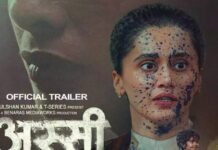Click https://bit.ly/komal539 if the above video does not autoplay.
Zee Studios and Emmay Entertainment’s Mrs. Chatterjee Vs Norway (UA) is the story of an Indian mother’s fight against a country which takes away both her kids from her by accusing her of being incapable of looking after them. The Norwegian laws provide for a welfare scheme under which children, who are not looked after properly by their parents, can be separated from them and kept under the government’s care by an agency, Velfred, identified by the government for the same. Huge amount of funds are released to the agency for every child so looked after by it. It is alleged that the agency has made a business out of this to amass funds which may not necessarily be spent for the children’s welfare. The film is based on a true-life story.
Debika Chatterjee (Rani Mukerji) and Anirudh Chatterjee (Anirban Bhattacharya) are settled in Norway. They have two kids, Shubh (Yuvaan Vanvari) and Shuchi (Irha Ali and Aaira Jain for different ages). As per law, the authorities of Velfred, the agency earmarked to look after kids who aren’t being looked after well enough at their own homes, visit the Chatterjees for due diligence. Ultimately, both, Shubh and Shuchi, are taken away by the agency as it feels, they need foster care. From then on, it is Mrs. Chatterjee’s fight against the country to get her children back.
Sameer Satija, Ashima Chibber and Rahul Handa have written a story which had the potential to be a tearjerker. But the trio’s screenplay does not have its heart in the right place. Rather than being an emotional tale of an Indian woman’s fight against a foreign country to get her children back, the drama turns out to be one which has very limited appeal, that too, for a thin section of the audience only.
Although Debika is educated, her behaviour in front of the government authorities, officials of Velfred and even in Norway’s courts is so shocking and if one may use the term, often reprehensible, that the audience are not able to feel sympathetic towards her in spite of Debika having been so terribly wronged by a nation. One would’ve preferred to see Debika finding herself helpless in a foreign land, suffering in silence, weeping for days and nights together and finally, one day bursting like a lava. But instead, Debika screams and shouts, creates scenes, accuses the officials, etc., thereby spoiling her own case. The viewers understand that Debika has been wronged but they also understand the futility of her reactions because they are practical enough to know that her ‘high-handedness’ will not take her anywhere. The writers may argue that the film is based on a true-life story. But they need to understand two things: one, every true-life story does not lend itself to a film; secondly, there is something known as ‘cinematic liberty’. The writers have also erred in establishing a lot of things through dialogues when there was need for visuals. For instance, it is mentioned in the court that Velfred is neglecting Debika’s kids. The audience ought to have been shown how the kids are being treated, for them to feel more empathy for Debika and her two kids, but that is not done. Likewise, Debika’s behaviour with her in-laws when they land in Norway is quite disgusting, to say the least. In times of adversity, it is human nature to embrace even one’s enemies as friends because one is in such a vulnerable state of mind, but Debika actually appears to misbehave with her in-laws. Therefore, when she pleads with those very in-laws later, the requisite emotions for Debika are not aroused among the viewers. Even Debika’s attitude towards husband Anirudh, after the kids have been taken away by Velfred, shows her in ‘bad’ light, which also comes in the way of the viewers feeling empathy for her. All in all, the screenplay is exactly what it should not have been. The trio’s dialogues are good but only at places. Besides, a lot of dialogues are in English, Bengali or Norwegian, which actually puts off the viewers because they would have come to watch a Hindi film.
Rani Mukerji is okay as Debika. Not only is she let down by a weak characterisation but even otherwise, her acting is not really praiseworthy, as it often is. The audience’s heart does not bleed for her. Anirban Bhattacharya is so-so as Anirudh Chatterjee. Jim Sarbh acts quite ably as Daniel Singh but the viewers are unable to decide whether he is a person to laud or detest. Neena Gupta should’ve been given more scope as Vasudha Kamat. The talented actress has been wasted in a bit role. Soumya Mukherjee is natural as Debika’s brother-in-law, Anurag. Mithu Chakrabarty stands out as Debika’s mother-in-law. Bodisattwa Majumdar and Saswati Guhathakurta make their presence felt as Debika’s parents. Ashok Mukerjee has his moments as Debika’s father-in-law. Britta Soll (as Velfred psychologist Matilda), Kärt Tammjärv (as Velfred psychologist Sia Larson), Tiina Tauraite (as Velfred psychologist Allis Ramsfjord), Sara Soulié (as Berit Hansen, the teacher who gives witness in court, against Velfred), Elina Purde (as Velfred lawyer Nora Berg), Yuvaan Vanvari (as Shubh), Maahir Raghuvanshi (as six-year-old Shubh), Charu Shankar (as lawyer Nandani), Barun Chanda (as judge Abhijeet Dutta), Varun Vazir (as Biswajeet Sarkar), Namit (as lawyer Sunil Kapoor), Roopangi Vanvari (as Rabia), Sangram Singh (as Harman Mehta), Purnendu Bhattacharya (as Madhusudan Gavai), Irha Ali (as Shuchi), Aaira Jain (as two-year-old Shuchi), Jagriti Bhatt (Norwegian translator in conference), and the others do as desired.
Ashima Chibber’s direction leaves something to be desired. She has not been able to make an emotional film for the large base of family audience. Instead, the film remains an elitist affair. Amit Trivedi’s music and Kausar Munir’s lyrics are okay. Hitesh Sonik’s background music is impactful. Alvar Kõue’s cinematography is good. Amin Khatib’s action and stunt scenes are quite nice. Priya Suhas’ production designing and Vijay Ghodke’s art direction are of a fine standard. Namrata Rao’s editing is reasonably sharp.
On the whole, Mrs. Chatterjee Vs Norway is a film with very limited appeal for the elite audience mainly. As such, it will not be able to make a mark at the ticket windows.
Released on 17-3-’23 at Inox (daily 5 shows) and other cinemas of Bombay by Zee Studios. Publicity: fairly nice. Opening: very weak. …….Also released all over. Opening was dull everywhere.





























